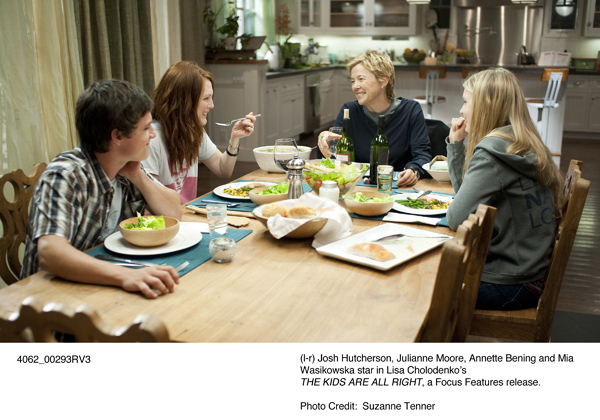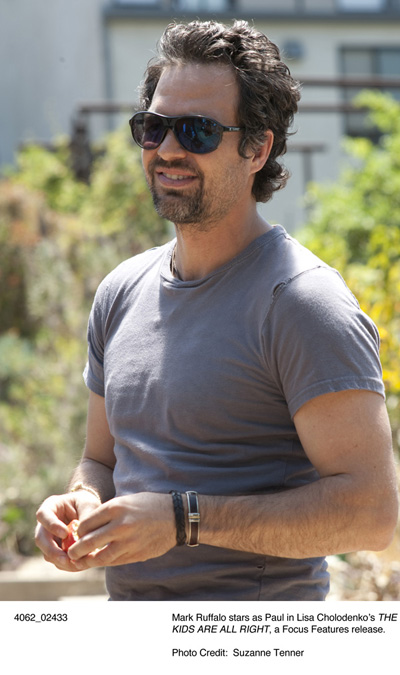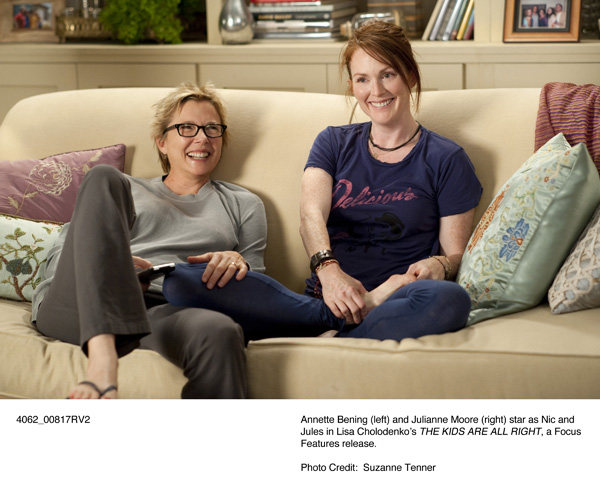Lisa Cholodenko’s new comedy The Kids Are Right is an unlikely summer film for only one reason: The central premise is of a same-sex couple Jules (Julianne Moore) and Nic ( Annette Bening) having family issues related to Paul (Mark Ruffalo), the father of their children. Drama and heartfelt humanity ensues.

Obviously, it’s the “same-sex” part that makes it unusual for mainstream school’s-out entertainment, and while that bit is essential, it’s also almost incidental: The issues faced by Nic and Jules — child-rearing, career, respect within the relationship, infidelity — are universal. It could just as well have been called, It’s Complicated For Gays, Too.
Joni and Laser are half-siblings — same father (sperm donor Paul), different moms. After Joni’s 18th birthday, they seek out their biological father, not looking for much more than a handshake and a phone number if someone needs an organ transplant. But Joni is unexpectedly taken by Paul’s hippie aesthetic (he’s an organic restaurateur) and quietly rebellious nature. Paul is suddenly part of the lives of the entire family.

Not to Jules and Nic’s pleasure, either, who see Paul as the moral equivalent of a dead-beat dad, who waltzes in with no responsibilities and snake-charms the kids they’ve spend decades rearing. Paul’s presence also triggers long-suppressed resentments and problems in the marriage.
Much of the plot of The Kids Are All Right is programmatic and cliche, but it resists easy categorization for two main reasons: First, its sparkling, natural style and second, its defiance of a conventional hero-villain dialectic. Moore and Bening, who seem to be acting completely without makeup, give bravely unfiltered performances. Neither seems worried with being seen unsympathetically — or, for that matter, as dyed-in-the-wool dykes. There’s a naughty sex scene here as funny as it is daring, but the gay content is nearly off-handed, and the dialogue is unforced, almost improvised. Ruffalo is just as winning, a crunchy granola adult with a winsome ease.
Which leads to the real victory of the film: You’re never sure who to root for. When you exit the theater, ask your significant other or best friend: Of the three leads, who was the protagonist? Who’s the antagonist? Ask six people, you’ll likely get six answers. That’s because the characters don’t fit in the neat little boxes of most Hollywood films; they seem to live and breathe outside the confines of the roles they are saddled with. Such emotional complexity is not only dramatically satisfying — nay, energizing — it’s real… more real, by far, than so-called reality TV.
A summer film that isn’t about fantasy? That is unusual. And definitely All Right with me.


“Much of the plot of The Kids Are All Right is programmatic and cliche” … cliche is a noun. Surely the author meant to say “Much of the plot of The Kids Are All Right is programmatic and cliched”?